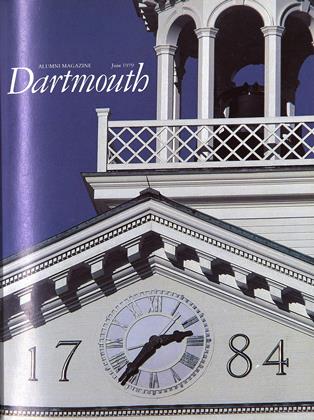The question was: "Technology: Servant or Master?" After considering equality and its price tag the first year and whither the social order, toward freedom or controls, the second, the third annual Senior Symposium fixed its attention this spring on technology's role in our lives.
All sorts of experts, indigenous and visiting, talked about such perplexing problems as the future of artificial intelligence; what decisions should be left up to computers; whether the Green Revolution be cornucopia or Pandora's box; the proper focus for limited medical resources, prolonging life or restoring health; whether nuclear energy is atomic manna or invitation to catastrophe.
Nobel Prize-winner George Wald came up from Cambridge to open the symposium with an address on "Living in a Lethal Society," delivered before a large audience that by turns cheered and quibbled. If technology is not mastered shortly, he warned, "It is difficult to see how the human race can survive" until the year 2000.
With civilization itself only 10,000 years old, the Industrial Revolution has in a comparative few "brought humankind to the brink of destruction," Wald suggested. He himself is as old as the use of gasoline, the Harvard biologist told his mostly youthful audience. Even though the civilized world got by without petroleum power until so recently, the question suddenly has become "Can we live without nuclear power?" To the contrary, he declared, "We cannot live with nuclear power!"
He condemned the mechanization that has made agriculture "our biggest user of fossil fuels," driving people off the land into cities, where they come to be what society judges as "marginal people, useless as consumers or producers." He remonstrated over the prevalence of "industrial disease on a grand scale," whereby the majority of cancers are environmentally induced and "it's getting harder to live while you're making a living."
But the biggest lumps he saved for the nuclear industry and nuclear weapons. The danger of nuclear accident - a risk great enough that "those superb realists, the insurance companies," won't insure the plants - is still the least important, Wald cautioned. More serious threats he sees in plutonium 239, "the most toxic substance there is," which is produced by power plants used to make weapons; and in accumulating nuclear wastes, for which no feasible disposal system exists. On top of its lethal hazards, "nuclear power is an economic disaster," Wald contended, ticking off the costs of clean-ups, of insurance, of surveillance, reprocessing, waste disposal, and plant decommissioning as examples. The stockpile of strategic nuclear weapons - equivalent to four tons of TNT for every man, woman, and child on earth - could mean "curtains for the human race" within one half hour, he declared.
Friends call him a "doom-kopf," said Wald. He remains "a reasonably happy person," he claimed, "because I don't accept the inevitability of disaster. And don't you accept it!"
"I'm telling you these things not to depress you, but to arouse you," Wald said. "Harvard is a fantasy world, and Dartmouth probably is too. Faced with apocalypse, they would set up a project and see what national foundation would fund it." Research, he insisted, can be "a trap to defer action. ... If we're going to save humanity, we're going to have to do it ourselves."
 View Full Issue
View Full Issue
More From This Issue
-
 Feature
Feature'We will all make whoopee'
June 1979 By Dick Holbrook -
 Feature
FeatureE – i – e – i – o
June 1979 By Marshall Ledger -
 Feature
FeatureExit with a Flourish
June 1979 By Beverly Foster -
 Feature
FeatureEncouraging growth, affirming the educational process
June 1979 By Robert Kilmarx -
 Article
ArticleCommencement
June 1979 By James L. Farley -
 Article
Article'Radical' with a Cause
June 1979 By Tim Taylor







